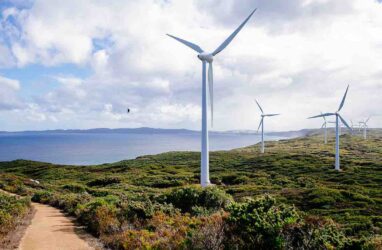Feed aggregator
Cement giant trials new carbon capture from flue gas technology at UK plant
INTERVIEW: Chemical firm explores creating Brazilian nature offsets
UK climate tech secures $15 mln in funding to enhance AI-enabled restoration tool
Laos to develop massive carbon project with private partner
Australia releases strategy that banks on gas beyond net zero target date
Consultancy launches new business line to help companies invest in carbon credits
Australia can have a future for the gas industry, or meet its climate commitments – but not both
Japanese offset provider secures $3 mln in funding round
W.A. to spend big on new transmission to connect more wind and solar
The post W.A. to spend big on new transmission to connect more wind and solar appeared first on RenewEconomy.
Biodiversity loss is biggest driver of infectious disease outbreaks, says study
Researchers say reducing emissions and biodiversity loss and preventing invasive species could control disease
Biodiversity loss is the biggest environmental driver of infectious disease outbreaks, making them more dangerous and widespread, a study has found.
New infectious diseases are on the rise and they often originate in wildlife. In meta-analysis published in the journal Nature, researchers found that of all the “global change drivers” that are destroying ecosystems, loss of species was the greatest in increasing the risk of outbreaks. Biodiversity loss was followed by climate change and introduction of non-native species.
Continue reading...‘When he is older there will be no rain’: how southern Madagascar is coping in a climate crisis
The island nation is one of the most vulnerable countries in the world, as changing weather patterns bring more dry spells and unpredictable rainy seasons. Sean Smith travelled to the south to meet those affected and to report on the ways they are trying to prepare for an altered future
Continue reading...Gold Standard teams up with industry body to aid carbon project development in Indonesia
Solar Insiders Podcast: How to get off gas and electrify
The post Solar Insiders Podcast: How to get off gas and electrify appeared first on RenewEconomy.
NSW predicted to miss legislated emissions targets
The post NSW predicted to miss legislated emissions targets appeared first on RenewEconomy.
Labor caves in to fossil fuel cartel as it locks in gas beyond 2050 amid deepening climate crisis
The post Labor caves in to fossil fuel cartel as it locks in gas beyond 2050 amid deepening climate crisis appeared first on RenewEconomy.
More than just panels on rooftops: How to make the most out of household PV and batteries
The post More than just panels on rooftops: How to make the most out of household PV and batteries appeared first on RenewEconomy.
Energy giants burst market limits as 3GW of coal goes missing, and consumers pay the price
The post Energy giants burst market limits as 3GW of coal goes missing, and consumers pay the price appeared first on RenewEconomy.
SK Market: South Korea CO2 auction fails as demand remains sluggish
England’s rivers to remain in poor state as EU laws ignored post-Brexit, says watchdog
Government’s failure to match EU measures to improve condition of rivers, lakes and oceans called ‘deeply concerning’
England’s rivers are likely to remain in a poor state for years to come because the government is failing to put in place EU clean water laws post-Brexit, the watchdog has found.
When Britain was a member of the EU, the government was required to follow the water framework directive (WFD), standards for waterways that have been credited with cleaning up Europe’s dirty water.
Under their worst-case assessment, just 21% of surface waters will be in a good ecological state by 2027, representing only a 5% improvement on the current situation. This would break the Environment Act, which aims to improve air and water quality, protect wildlife, increase recycling and reduce plastic waste.
There is insufficient funding to meet the targets, meaning that under the WFD ministers are being compelled by the OEP to write a new, properly funded plan to protect the country’s waters. The Environment Agency has calculated a cost of £51bn to clean up England’s waters, which would provide £64bn in monetisable benefits. However, confirmed funding of only £6.2bn is just 12% of that required.
There is not enough monitoring taking place to find out the state of England’s waterways, making it nigh on impossible to clean them up.
Continue reading...








